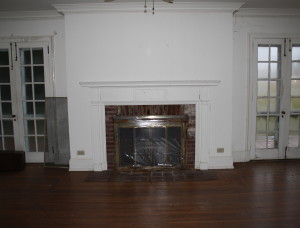By rushing Longwood demolition permit, they undermined planners, public
By Kathleen Brady Shea, Managing Editor, The Times
 An ax fell Tuesday night on preservationists’ hopes that three Longwood Gardens bungalows along U.S. 1 could be saved.
An ax fell Tuesday night on preservationists’ hopes that three Longwood Gardens bungalows along U.S. 1 could be saved.
Two of the three Kennett Township supervisors not only granted Longwood a demolition permit with no conditions attached, but they also solicited approval from Longwood to have two local fire companies use the buildings as simulated fire sites for training – exercises that they acknowledged would damage the 1920s structures.
Since the buildings are going to come down, anyway, why not let firefighters break into them so they can extinguish a pretend blaze? After all, these valued volunteers deserve realistic training venues – not to mention our utmost gratitude. The answer lies within the buildings, which boast fireplaces, built-in cabinets, stairways, and other elaborate architectural features.

An interior doorway in one of the cottages destined for the wrecking ball shows the attention to detail that preservationists hoped to save.
The cottages were commissioned with attention to detail by Pierre S. du Pont, himself an avowed preservationist, to house some of his staff. In fact, du Pont reportedly purchased the land which became Longwood Gardens because it contained trees that he wanted to save.
Permitting the destruction of these historic artifacts would be a travesty, and although it would be consistent with the two supervisors’ sorry handling of this issue, a spokeswoman for Longwood Gardens said “a full recycle, reuse plan for the homes” would occur prior to any demolition.
That’s welcome news, especially because Supervisor Robert A. Hammaker and Supervisors’ Chairman Michael E. Elling apparently sought no such guarantee. Before issuing the permit, they heard a litany of pleas from residents, respected preservationist groups, neighboring municipalities, and the township’s own Planning Commission, urging them to grant a delay so that other options could be fully explored. Supervisor Scudder Stevens, who supported the delay, read excerpts from letters submitted by groups that could not attend the meeting.
None of the parties suggested that Longwood Gardens had no right to raze the buildings. It has every right, they agreed. However, opponents of demolition pointed out that the township had every right to postpone the decision. And if all avenues to avoid the wrecking ball could not be avoided, the township also had the right to impose conditions.
For example, the Planning Commission had suggested negotiating an easement so that the swath of land in question, which Longwood plans to return to a 19th-century-like agrarian landscape adjacent to the gardens’ entrance, would remain that way decades from now. If future stewards of the gardens decide to erect an eyesore on the site years from now, area residents can thank Elling and Hammaker for the view.
The two supervisors responded to the outpouring of concerns by blithely ignoring them, raising questions about their responsibility to their constituents as well as to the township. They had much to gain and nothing to lose by holding off on the permit. Instead, by short-circuiting the review process, they undermined the Planning Commission, angered many residents, and generated suspicion about their motivation.
Even the venerable Longwood Gardens lost in the process. While it won the permit, it failed to capitalize on an opportunity to engender good will with its neighbors. Several members of the Planning Commission expressed public disappointment that Longwood showed no interest in negotiating any kind of settlement.
If that’s not the message that Longwood wanted to send, perhaps it needs to remind its attorney that being a zealous advocate does not necessitate alienating the other side. Mary Ann Rossi has a well-deserved reputation for zoning expertise, but she rankled many with her brusque approach. When the township’s Planning Commission sought more time to try and work out a compromise, Rossi made it clear that further talks would not be welcomed. “We do not embrace an additional delay,” she said.
So now Longwood has an opportunity to embrace the community and undo some of the damage. One positive step in that direction is the assurance that the contents of the homes will be saved. It could also accept some of the conditions proposed by the Planning Commission on its own or devise another method of rapprochement. Absent that, it creates a stark contrast between the ugliness of these proceedings and the beauty of the gardens.
In the meantime, does anyone have any buildings with no historic significance where firefighters can wield their axes with abandon?






